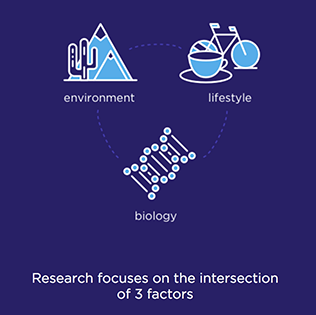UNC thought leaders and practitioners convene to discuss Precision Medicine
"Precision medicine gives us the chance to marry what's unique about America — our spirit of innovation, our courage to take risks, our collaborative instincts — with what's unique about Americans — every individual's distinctive genetic makeup, lifestyles, and health needs. In doing so, we can keep ourselves, our families, and our nation healthier for generations to come."
Those words, written by former President Obama and published in an op-ed in the Boston Globe last year, represent the lofty goal of precision medicine. Today, researchers at the University of North Carolina at Chapel Hill and other medical institutions are trying to operationalize that goal — to develop ways to target the right treatments to the right patient at the right time.
The UNC School of Medicine (SOM) and the NC TraCS Institute at UNC-Chapel Hill have facilitated a number of events to define the main areas of focus for these efforts. On October 20, NC TraCS held a "CTSA Conversations" session centered on the theme of Precision Health at Chapel Hill. There, attendees learned what precision health is, how it works, and how it can be supported by NC TraCS resources and expertise.
The SOM initiated a larger symposium on Precision Medicine on October 31, 2017, with the help of NC TraCS. The event was titled "Defining Precision Medicine at UNC: Charting the Path to Better Health Care" at the William and Ida Friday Center in Chapel Hill.

In her opening remarks at the symposium, Blossom Damania, PhD, Vice Dean for Research in the SOM described Precision Medicine as "a new way to treat and prevent disease by tailoring treatment or prevention strategies based on an individual's genetics, lifestyle, and environmental exposures." She stated that the SOM has a keen interest in formulating a plan for Precision Medicine and will create additional opportunities for investigators interested in the emerging discipline to exchange ideas and come together to form teams."
In subsequent comments, Terry Magnuson, PhD, UNC Vice Chancellor for Research, indicated that this was just the beginning. "We intend to have several working groups and symposia to develop recommendations that we can combine into a program to present to the Chancellor," he said. "Precision Health and Society is one of UNC's top six research priorities. We need to zero in on what is important so we know how to move forward."
The symposium brought together approximately 75 scientists, clinicians, and administrators, from more than 32 different departments across UNC-Chapel Hill. An opening plenary session highlighted four exemplar precision medicine projects — on topics including asthma, sepsis, genomic screening, and drug efficacy — and provided some information about potential funding. For example, Tina Schade Willis, MD, Director of the UNC Institute for Healthcare Quality Improvement, explained that health care providers are under a lot of pressure to treat sepsis, a heterogenous disease, in a homogenous way. Today, sepsis is the number one cause of death in U.S. Hospitals. "We need something now that helps with this imprecise medicine," she said.
Following the plenary, the attendees broke into four working groups in (1) Informatics, Environment, and Health; (2) Health Care System and Informatics; (3) Genomics and Personalized Medicine; and (4) Drug Efficacy Determinants. There, they began to discuss and develop precision medicine proposals specifically targeted to their topic area.
After lunch and several rounds of discussions, the entire group gathered together to present their key recommendations, which included the following:
- Identify UNC's unique strengths/data to differentiate ourselves (i.e., nutrition, environmental data)
- Develop a centralized system or overarching body to drive this initiative and remove silos to facilitate collaborations across university and health care system
- Link different types of data to EHR inform discovery (i.e., link tumor registry with insurance data)
- Develop capability for high degree computational integration and effective information flow
- Prioritize the discovery component of precision medicine
- Personalize on patient side, not just provider side, to consider tension between clinical paths (standardization) and practice of precision medicine
- Articulate research needs to research development group to increase productivity
- Identify "use-case" to demonstrate how precision health can be realized in 12 months to provide institutional leadership with inspiration for commitment
- Secure an institutional commitment to support this initiative, because NIH funding is not enough
- Join SOM and Health Care resources together to help with funding precision medicine
- Consider regional stakeholders to partner with who can provide specialized resources and expertise (i.e., SAS, IBM)
Moving forward, Karen Demby, PhD, NC TraCS Administrative Director for Team Science and a member of the Precision Medicine planning committee, says that they plan to convene working groups made up of attendees as well as other members of the research community to follow-up on various action items that emerged from the symposium.
Damania serves as project champion in the SOM. She is joined by Jennifer Brennan, PhD, Director of the Office of Research in the SOM; Corbin Jones, PhD, Professor of Biology; David Peden, MD, NC TraCS Director for Team Science and Senior Associate Dean for Translational Research; Ian Buchanan, MD, Chief Research Officer for UNC Healthcare; and Tim Carey, MD, Co-Director of NC TraCS, as leaders of the planning committee. Future plans include pilot funding opportunities for Precision Medicine/Health from the SOM and the Office of the Vice Chancellor for Research.